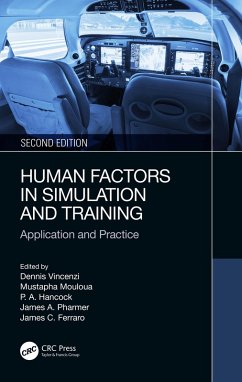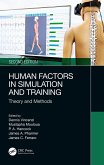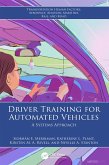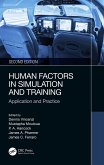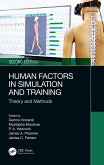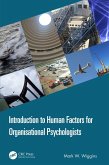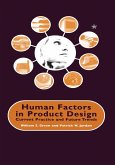Human Factors in Simulation and Training (eBook, ePUB)
Application and Practice
Redaktion: Vincenzi, Dennis A.; Ferraro, James C.; Pharmer, James A.; Hancock, Peter; Mouloua, Mustapha
48,95 €
48,95 €
inkl. MwSt.
Sofort per Download lieferbar

24 °P sammeln
48,95 €
Als Download kaufen

48,95 €
inkl. MwSt.
Sofort per Download lieferbar

24 °P sammeln
Jetzt verschenken
Alle Infos zum eBook verschenken
48,95 €
inkl. MwSt.
Sofort per Download lieferbar
Alle Infos zum eBook verschenken

24 °P sammeln
Human Factors in Simulation and Training (eBook, ePUB)
Application and Practice
Redaktion: Vincenzi, Dennis A.; Ferraro, James C.; Pharmer, James A.; Hancock, Peter; Mouloua, Mustapha
- Format: ePub
- Merkliste
- Auf die Merkliste
- Bewerten Bewerten
- Teilen
- Produkt teilen
- Produkterinnerung
- Produkterinnerung

Bitte loggen Sie sich zunächst in Ihr Kundenkonto ein oder registrieren Sie sich bei
bücher.de, um das eBook-Abo tolino select nutzen zu können.
Hier können Sie sich einloggen
Hier können Sie sich einloggen
Sie sind bereits eingeloggt. Klicken Sie auf 2. tolino select Abo, um fortzufahren.

Bitte loggen Sie sich zunächst in Ihr Kundenkonto ein oder registrieren Sie sich bei bücher.de, um das eBook-Abo tolino select nutzen zu können.
Human Factors in Simulation and Training: Application and Practice covers the latest applications and practical implementations of advanced technologies in the field of simulation and training.
- Geräte: eReader
- mit Kopierschutz
- eBook Hilfe
Andere Kunden interessierten sich auch für
![Human Factors in Simulation and Training (eBook, ePUB) Human Factors in Simulation and Training (eBook, ePUB)]() Human Factors in Simulation and Training (eBook, ePUB)48,95 €
Human Factors in Simulation and Training (eBook, ePUB)48,95 €![Driver Training for Automated Vehicles (eBook, ePUB) Driver Training for Automated Vehicles (eBook, ePUB)]() Siobhán E. MerrimanDriver Training for Automated Vehicles (eBook, ePUB)125,95 €
Siobhán E. MerrimanDriver Training for Automated Vehicles (eBook, ePUB)125,95 €![Human Factors in Simulation and Training (eBook, PDF) Human Factors in Simulation and Training (eBook, PDF)]() Human Factors in Simulation and Training (eBook, PDF)48,95 €
Human Factors in Simulation and Training (eBook, PDF)48,95 €![Human Factors in Simulation and Training (eBook, PDF) Human Factors in Simulation and Training (eBook, PDF)]() Human Factors in Simulation and Training (eBook, PDF)48,95 €
Human Factors in Simulation and Training (eBook, PDF)48,95 €![Introduction to Human Factors for Organisational Psychologists (eBook, ePUB) Introduction to Human Factors for Organisational Psychologists (eBook, ePUB)]() Mark W. WigginsIntroduction to Human Factors for Organisational Psychologists (eBook, ePUB)49,95 €
Mark W. WigginsIntroduction to Human Factors for Organisational Psychologists (eBook, ePUB)49,95 €![Navigating the Engineering Organization (eBook, ePUB) Navigating the Engineering Organization (eBook, ePUB)]() Robert M. SanterNavigating the Engineering Organization (eBook, ePUB)50,95 €
Robert M. SanterNavigating the Engineering Organization (eBook, ePUB)50,95 €![Human Factors in Product Design (eBook, ePUB) Human Factors in Product Design (eBook, ePUB)]() Human Factors in Product Design (eBook, ePUB)67,95 €
Human Factors in Product Design (eBook, ePUB)67,95 €-
-
-
Human Factors in Simulation and Training: Application and Practice covers the latest applications and practical implementations of advanced technologies in the field of simulation and training.
Dieser Download kann aus rechtlichen Gründen nur mit Rechnungsadresse in A, B, BG, CY, CZ, D, DK, EW, E, FIN, F, GR, HR, H, IRL, I, LT, L, LR, M, NL, PL, P, R, S, SLO, SK ausgeliefert werden.
Produktdetails
- Produktdetails
- Verlag: Taylor & Francis eBooks
- Seitenzahl: 362
- Erscheinungstermin: 30. August 2023
- Englisch
- ISBN-13: 9781000909258
- Artikelnr.: 68444804
- Verlag: Taylor & Francis eBooks
- Seitenzahl: 362
- Erscheinungstermin: 30. August 2023
- Englisch
- ISBN-13: 9781000909258
- Artikelnr.: 68444804
- Herstellerkennzeichnung Die Herstellerinformationen sind derzeit nicht verfügbar.
Dennis A. Vincenzi received his Doctoral degree in 1998 from the University of Central Florida in Human Factors and Applied Experimental Psychology and has over 20 years of experience as a Human Factors researcher. He has been employed by Embry-Riddle Aeronautical University from 1999 to 2004 where he held the position of Assistant Professor in the Department of Human Factors and Systems in Daytona Beach. In 2004, Dr. Vincenzi left Embry-Riddle to work for the United States Navy as a Senior Human Factors Engineer at the Naval Air Warfare Center Training Systems Division (NAWCTSD) in Orlando, Florida, USA. His duties included performing Human Factors research involving simulation and training system development for a variety of Navy sea and air platforms including the F/A 18 Hornet and Super Hornet, F-35 JSF, Los Angeles, Ohio, and Virginia class submarines, and Littoral Combat Ship (LCS). He was also heavily involved in research involving pilot selection, human performance, and ground control station design for a number of Navy, Marine Corps, and Special Operations Command Unmanned Aerial Systems (UAS). Since returning to Embry-Riddle Aeronautical University in 2012, Dr. Vincenzi has been involved in research related to UAS and regulatory requirements within the NAS and has been heavily involved in the development of an experimental gesture-based interface used for investigating user preference, usability, and functionality issues related to interface design in virtual environments. Dr. Vincenzi is currently the Program Chair for the Master of Science in Human Factors program at Embry-Riddle Aeronautical University. Mustapha Mouloua is a Professor of Psychology and the Director of the Transportation Research Group at the University of Central Florida (UCF), Orlando, Florida. He received his PhD (1992) and M.A. (1986) degrees in Applied/Experimental Psychology from the Catholic University of America, Washington, D.C. Before joining the faculty at UCF in 1994, he was a Postdoctoral Fellow at the Cognitive Sciences Laboratory of the Catholic University of America from 1992 to1994 where he studied and researched several aspects of human-automation interaction topics sponsored by NASA, and the Office of Naval Research (ONR). He has over 28 years of experience in the teaching, research & development, and evaluation of complex human-machine systems. His research interests include human performance evaluation, human-automation interaction, pilot-alerting systems interaction, automation and workload, pilot training and detection of automation failures, adaptive function allocation and human monitoring of systems, cognition and performance of older pilots, and drivers, simulation technologies, and training in transportation systems. He has over 200 publications and scientific reports published in journals such as Experimental Aging Research, Human Factors, Ergonomics, Perception and Psychophysics, Journal of Experimental Psychology: Human Perception and Performance, International Journal of Aviation Psychology, Journal of Cognitive Engineering and Decision Making, etc. He was previously the Director of the Applied/Experimental and Human Factors Psychology doctoral program (2008-2017). At UCF, Dr. Mouloua received 8 prestigious Teaching and Research Awards and was inducted into the UCF College of Sciences Millionaire Club for procuring over $1 Million in research funds. He was awarded a UCF "Twenty Years' Service" award in 2014, was awarded the UCF International Golden Key and Honorary member status in 2011, and his research was selected to be among the top-30 best published research articles in the last 50 years by the Human Factors and Ergonomics Society in 2008. Peter A. Hancock, D.Sc., Ph.D. is Provost Distinguished Research Professor in the Department of Psychology and the Institute for Simulation and Training, as well as at the Department of Civil and Environmental Engineering and the Department of Industrial Engineering and Management Systems at the University of Central Florida (UCF). At UCF in 2009 he was created the 16th ever University Pegasus Professor (the Institution's highest honor) and in 2012 was named 6th ever University Trustee Chair. He directs the MIT2 Research Laboratories. He is the author of over one thousand refereed scientific articles, chapters, and reports as well as writing and editing more than twenty books. He has been continuously funded by extramural sources for every one of the thirty¿ six years of his professional career. This includes support from NASA, NSF, NIH, NIA, FAA, FHWA, NRC, NHTSA, DARPA, NIMH, and all of the branches of the US Armed Forces. He has presented or been an author on, over 1,000 scientific presentations. In association with his colleagues Raja Parasuraman and Anthony Masalonis, he was the winner of the Jerome Hirsch Ely Award of the Human Factors and Ergonomics Society for 2001, the same year in which he was elected a Fellow of the International Ergonomics Association. In 2006 he won the Norbert Wiener Award of the Systems, Man and Cybernetics Society of the Institute of Electrical and Electronics Engineers (IEEE), being the highest award that Society gives for scientific attainment. He is a Fellow and past President of the Human Factors and Ergonomics Society and a Fellow and past President of the Society of Engineering Psychologists as well as being a former Chair of the Board of the Society for Human Performance in Extreme Environments. Most recently he has been elected a Fellow of the Royal Aeronautical Society (RAeS) and in 2016 was named the 30th Honorary Member of the Institute of industrial and Systems Engineers (IISE). He currently serves as a member of the United States Air Force, Scientific Advisory Board (SAB), while simultaneously serving on the US Army Science Board (ASB). In July of 2019, he was elected as the forthcoming President of the Human Factors and Ergonomics Society (HFES). He is only the second person ever to have been elected to that position twice. James Pharmer holds a doctoral degree in Applied Experimental Human Factors Psychology from the University of Central Florida and a master's degree in Engineering Psychology from the Florida Institute of Technology. Dr. Pharmer is a Naval Air Systems Command (NAVAIR) Fellow and the Principal Scientist for the Research, Development, Test, and Evaluation (RDT&E) Department at the Naval Air Warfare Center Training Systems Division (NAWCTSD). He has over 20 years of experience in the research and development of advanced military training systems across a variety of domains. His work includes conducting research and development and directly participating in systems acquisition teams to support human systems integration (HSI) implementation for Navy ships, aircraft, and systems. He currently chairs multiple working groups to develop HSI policy, processes, and education. James C. Ferraro, Ph.D. Dr. Ferraro is a human factors research scientist specializing in simulation and game-based assessment of human performance in complex systems. He received his Ph.D. in Human Factors and Cognitive Psychology from the University of Central Florida (UCF) in 2022 and his M.A. in Applied Experimental and Human Factors Psychology from UCF in 2019. Dr. Ferraro has led and contributed to a number of research efforts in support of government-sponsored projects to improve training of personnel in various occupations. Areas include air traffic control, tactical urban warfare, and unmanned aircraft operations. His research on topics such as pilot/operator attentional strategies, trust in automated systems, and predictors of individual performance has been presented at local, regional, and international conferences and published in multiple academic journals. He is the technical editor of the two-volume book set Human Performance in Automated and Autonomous Systems (2019) and the co-author of published book chapters pertaining to human monitoring of automated systems and the role of trust in unmanned vehicle operations. Dr. Ferraro is currently a Research Scientist with Adaptive Immersion Technologies, based in Tampa, Florida.
1. Controls and Displays for Aviation Research Simulation: A Historical
Review. 2. Augmented Reality as a Means of Job Task Training in Aviation.
3. Civil Aviation: Flight Simulators and Training. 4. Integrating
effective training and research objectives: Lessons from the Black Skies
series of exercises. 5. Extended Reality in Training Environments: A Human
Factors Trend Analysis. 6. Mitigation of motion sickness symptoms by
Adaptive Perceptual Learning: Implications for space and cyber
environments. 7. Decision Making Under Crisis Conditions: A Training and
Simulation Perspective. 8. Healthcare Simulation and Training. 9. Best
Practices in Surgical Simulation. 10. Healthcare Simulation Methods: A
Multi-Faceted Approach. 11. Design and Development of Algorithms for
Gesture Based Control of Semi-Autonomous Vehicles. 12. The Influence of
New Realities: How Virtual, Augmented, and Mixed Reality Advance Training
Methods in Aviation. 13. Training, Stress, Time Pressure and Surprise: An
Accident Case Study.
Review. 2. Augmented Reality as a Means of Job Task Training in Aviation.
3. Civil Aviation: Flight Simulators and Training. 4. Integrating
effective training and research objectives: Lessons from the Black Skies
series of exercises. 5. Extended Reality in Training Environments: A Human
Factors Trend Analysis. 6. Mitigation of motion sickness symptoms by
Adaptive Perceptual Learning: Implications for space and cyber
environments. 7. Decision Making Under Crisis Conditions: A Training and
Simulation Perspective. 8. Healthcare Simulation and Training. 9. Best
Practices in Surgical Simulation. 10. Healthcare Simulation Methods: A
Multi-Faceted Approach. 11. Design and Development of Algorithms for
Gesture Based Control of Semi-Autonomous Vehicles. 12. The Influence of
New Realities: How Virtual, Augmented, and Mixed Reality Advance Training
Methods in Aviation. 13. Training, Stress, Time Pressure and Surprise: An
Accident Case Study.
1. Controls and Displays for Aviation Research Simulation: A Historical
Review. 2. Augmented Reality as a Means of Job Task Training in Aviation.
3. Civil Aviation: Flight Simulators and Training. 4. Integrating
effective training and research objectives: Lessons from the Black Skies
series of exercises. 5. Extended Reality in Training Environments: A Human
Factors Trend Analysis. 6. Mitigation of motion sickness symptoms by
Adaptive Perceptual Learning: Implications for space and cyber
environments. 7. Decision Making Under Crisis Conditions: A Training and
Simulation Perspective. 8. Healthcare Simulation and Training. 9. Best
Practices in Surgical Simulation. 10. Healthcare Simulation Methods: A
Multi-Faceted Approach. 11. Design and Development of Algorithms for
Gesture Based Control of Semi-Autonomous Vehicles. 12. The Influence of
New Realities: How Virtual, Augmented, and Mixed Reality Advance Training
Methods in Aviation. 13. Training, Stress, Time Pressure and Surprise: An
Accident Case Study.
Review. 2. Augmented Reality as a Means of Job Task Training in Aviation.
3. Civil Aviation: Flight Simulators and Training. 4. Integrating
effective training and research objectives: Lessons from the Black Skies
series of exercises. 5. Extended Reality in Training Environments: A Human
Factors Trend Analysis. 6. Mitigation of motion sickness symptoms by
Adaptive Perceptual Learning: Implications for space and cyber
environments. 7. Decision Making Under Crisis Conditions: A Training and
Simulation Perspective. 8. Healthcare Simulation and Training. 9. Best
Practices in Surgical Simulation. 10. Healthcare Simulation Methods: A
Multi-Faceted Approach. 11. Design and Development of Algorithms for
Gesture Based Control of Semi-Autonomous Vehicles. 12. The Influence of
New Realities: How Virtual, Augmented, and Mixed Reality Advance Training
Methods in Aviation. 13. Training, Stress, Time Pressure and Surprise: An
Accident Case Study.
